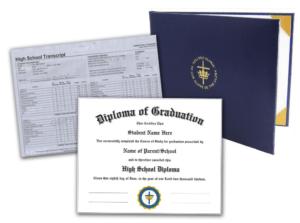Graduating from Homeschool
Getting Ready to Launch
When Does My Child Graduate?
This is one of the most common questions we hear.
In Virginia, the parent—as the administrator, planner, teacher, and facilitator—is the person who determines and verifies completion of the student’s course of study.
A Homeschooled Student Has Graduated When
- the student has completed the course of study outlined by the parent.
- the parent has presented the student with a signed and dated diploma; and
- the parent has prepared a transcript that documents the course of study, grades, credits, and overall GPA
Alternatively, if a student is enrolled in a correspondence course or distance learning program, the course administrator will verify completion of the course of study and, in most cases, sign the diploma.
Once graduated, regardless of age, a teen is no longer under compulsory school attendance laws.
In § 22.1-254(A), the law states: “The requirements of this section shall not apply to…(b) any child who has obtained a high school diploma or its equivalent, a certificate of completion, or has achieved a passing score on a high school equivalency examination approved by the Board of Education, or who has otherwise complied with compulsory school attendance requirements as set forth in this article.”
When to Notify (or Not) the Superintendent or School Board
The law does not require permission or notification to the superintendent when a child graduates. Superintendents do not have the statutory authority to view, approve, or require verification or documentation of graduation or completion of programs from non-public school students.
In some cases, institutes of higher education, the military, trade schools, police academies, prospective employers, etc. require proof of compliance with the homeschool laws of their applicant. In accordance with § 22.1-254.1(G), verification of compliance with home instruction law may be released by a school district, which requires the written permission of a parent or adult student.
If your student is 18 prior to the August 15 NOI filing deadline and you are continuing home instruction, you are not required to submit a Notice of Intent (NOI) for the coming year because your 18 year old is no longer subject to compulsory education laws. Neither are you required to send in testing results if your student is 18 prior to the August 1 testing deadline.
If a student is under the age of 18 on August 15, parents should submit a NOI for the coming year. However, you are not required to submit test results the following year if your student has graduated, or if he has turned 18 prior to the August 1 testing deadline because he is no longer under homeschool laws or compulsory attendance laws.
Diploma and Transcript
A diploma represents completing a course of study for your student’s education.
Virginia § 1-240.1 defines parental rights under Virginia law: “A parent has a fundamental right to make decisions concerning the upbringing, education, and care of the parent’s child.”
Because home instruction is a lawful form of education in Virginia, parents have inherent authority to issue a diploma as evidence of graduation. As such, while state agencies and public schools may verify compliance with laws, they do not have the statutory authority to issue or verify homeschool diplomas.
For most homeschooled students,* parents set the requirements for completion.
Parents sign, date, and issue a diploma.
A transcript should accompany the diploma. This is a record of completed high school-level courses and their final grades. This record should show
- the name, address, and best contact method (phone and/or email) for the homeschool or parents;
- the name, address, and best contact method for the student;
- the courses taken in each year of school with their grades and credit value reflected;
- the cumulative GPA with methodology; and
- the high school graduation date.
Some parents also include important educational and extracurricular experiences, career training, or volunteer work.
A diploma supported by a transcript is important. A diploma and transcript are often requested by colleges, federal financial aid programs, trade schools, military recruiters, police academies, and employers. A parent-created transcript and parent-signed diploma are universally accepted as evidence of graduation.
*A homeschooled student can also receive a diploma from a correspondence school or a distance learning program.
A diploma and transcript show:
- professionalism;
- an important benchmark in the educational process;
- the hard work and academic achievement of the student;
- acquired knowledge of specific subjects;
- determination and willingness to take advantage of learning opportunities and
- the development of work habits, career skills, and good character that can prepare a student for the future.
A parent-created transcript and parent-signed diploma are accepted as evidence of graduation by community colleges, state and private colleges, the military, federal financial aid, and the workforce.
If you’re uncertain about creating your own diploma and transcript, HEAV can help with these services. HEAV’s homeschool transcript service is designed to guide you through the ins and outs of creating a college- or career-ready transcript.
The deluxe diploma was designed especially for HEAV and is printed in rich black ink on parchment. This certificate will be inscribed with the graduate’s name, date of graduation (June 10, 2017), and the parents’ names or family school name. An engraved seal and gold ribbon corners adorn the diploma–it is NOT a stick-on seal and printed corners as seen on other diplomas. It is encased in a beautiful, padded navy case with matching seal.
Graduation Ceremony
Whether or not to have a graduation ceremony is up to the parents and graduates, but many families like to mark this important milestone with a celebration or other event. It can be a simple family and friends get-together, a special day with a homeschool co-op, or a traditional commencement ceremony such as the one HEAV hosts at the annual Virginia homeschool convention.
HEAV Graduation Ceremony
Hosted by HEAV at the annual homeschool convention every June, the HEAV graduation offers your student the chance to mark this milestone in a godly ceremony.
Applying to College
A Note About Common App
Many college-bound students now choose to apply for college through Common App. This is a nonprofit that allows applicants to apply to over 1,000 member colleges, universities, and community colleges in all 50 states and several other countries. If a student chooses to participate, they create an account and college application with Common App. This enables a streamlined process where they can track deadlines and additional requirements or supplements of the individual institutions to which they apply.
In Common App, the student directs their application to any participating institution of higher education. In the case of homeschool students, they first select that they are “Homeschooled.” Secondly, they must authorize the release of their records. Finally, they invite their homeschool supervisor (usually a parent) as their school counselor under “Invite Recommenders” within the system.
If your homeschool student has opted to complete Common App to apply to college(s), the parent must create a separate Counselor Account. From this account, the parent will title themselves, give information about their homeschool, and upload their child’s transcript, course descriptions, letters, etc. Not all of the criteria match homeschool situations, but the higher education recipients of the application are aware that the student is homeschooled and accustomed to idiosyncrasies.
Financial Aid
Listen to Lorraine SantaLucia’s workshop, “Demystifying Finding Aid for Higher Education.”
Other Resources
More questions? Check out more questions and answers from “Homeschool Q&A,” the popular feature in HEAV’s weekly e-newsletter, the Virginia Homeschool Update.
Get more high school information and resources here!


